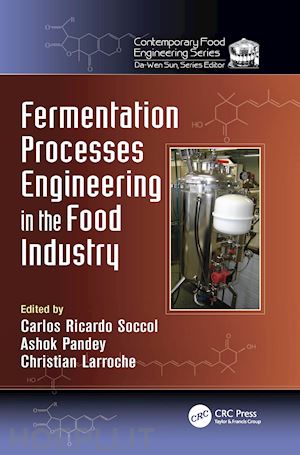Applications of Metabolic Engineering in the Production of Fermented Foods and Food Ingredients; Dimitris Charalampopoulos and Colin WebbIsolation, Improvement, and Preservation of Microbial Cultures; Syed G. DastagerPhysical and Chemical Factors Affecting Fermentation in FoodProcessing; Antonella Amore and Vincenza FaracoUpstream Operations of Fermentation Processes; Parameswaran Binod, Raveendran Sindhu, and Ashok PandeyTheoretical Tools to Predict Physicochemical Properties ofIndustrial Foods and Cultivation Media; André LebertCharacterization of Bioreactors Using Computational FluidDynamics; Christophe Vial and Youssef StiribaLaboratory and Industrial Bioreactors for SubmergedFermentations; Parvinder Kaur, Ashima Vohra, and Tulasi SatyanarayanaLaboratory and Industrial Bioreactors for Solid-StateFermentation; José Angel Rodríguez-León, Daniel Ernesto Rodríguez-Fernández, and Carlos Ricardo SoccolDownstream Operations of Fermented Products; Júlio César de Carvalho, Adriane Bianchi Pedroni Medeiros, Daniel Ernesto Rodríguez-Fernández, Luiz Alberto Júnior Letti, Luciana Porto de Souza Vandenberghe, Adenise Lorenci Woiciechowski, and Carlos Ricardo SoccolInstrumentation and Control of Industrial Fermentative Processes; Alexandre Francisco de Moraes Filho, Alysson Hikaru Shirai,Wilerson Sturm, and Dario Eduardo Amaral DergintFermented Foods and Human Health Benefits of FermentedFunctional Foods; Juliano De Dea Lindner, Ana Lúcia Barretto Penna, Ivo Mottin Demiate, Caroline Tiemi Yamaguishi,Maria Rosa Machado Prado, and José Luis ParadaIndustrial Fermentation for Production of Alcoholic Beverages; Saurabh Jyoti Sarma, Mausam Verma, and Satinder Kaur BrarProduction of Dairy Products; Luciana Porto de Souza Vandenberghe, Caroline Tiemi Yamaguishi, Cristine Rodrigues,Maria Rosa Prado, Michele Rigon Spier, Adriane Bianchi Pedroni Medeiros, and Júlio César de CarvalhoDairy and Nondairy Probiotic Products and Beverages; Jean-Luc Tholozan and Jean-Luc CayolBioadditives Produced by Fermentation; Juliano Lemos Bicas, Mário Roberto Marostica Junior Francisco Fábio Cavalcante Barros, Gustavo Molina, and Gláucia Maria PastoreMicroalgae for Food Production; Jorge Alberto Vieira Costa and Michele Greque de MoraisBiorefinery Concept Applied to Valorization of Agro-FoodCoproducts and Wastes: Integrated Process for Waste Recyclingand Effluent Treatment; Carlos Ricardo Soccol, Susan Grace Karp, Paula Fernandes de Siqueira, Cássia Tiemi Nemoto Sanada, Vanete Thomaz-Soccol, and Ashok PandeyIndex











